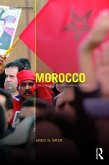This book examines the socioeconomic and political development of Libya since independence in 1951 with a focus on the four decades of revolutionary rule which began in 1969. Following a brief look at pre-independence Libya, it explores the way in which the fragility of the post-independence state, unable to contain rising Arab nationalist struggles and growing economic expectations, opened the way for the Free Unionist Officers led by Muammar al-Qaddafi to seize power. It then traces the progressive development of the revolutionary state through four stages: the consolidation of power to 1973, the projection of power to 1986, withdrawal and retrenchment to 1999, and the redefinition of the state after 1999. In following this outline, the emphasis in each chapter is on the post-1999 period, highlighting the issues facing the contemporary state along with possible solutions. It also includes coverage of the fall of Qaddafi, the new state institutions and current political situation.
Retaining the conceptual framework of the first edition through emphasis of the dual themes of continuity and change, the second edition of Libya is revised and updated to include discussion of key developments since 2010, including:
- The political process which evolved in the course of the February 17 Revolution and led to GNC elections in July 2012, a new constitution in 2012-13, and national elections in mid-2013.
- Post-Qaddafi economic policy from the National Transitional Council and subsequent interim governments, to the announced economic policies of the national government elected in mid-2013.
- Post-Qaddafi Libyan foreign policy.
- The February 17 Revolution and the death of Qaddafi.
- The on-going process of drafting a new constitution, the election of Parliament and of a President.
Providing a comprehensive overview of the region seen to be the exception to the Arab Spring, and highlighting the issues facing contemporary Libya, this book is an important text for students and scholars of History, North Africa and the Middle East as well as non-specialist with an interest in current affairs.
Hinweis: Dieser Artikel kann nur an eine deutsche Lieferadresse ausgeliefert werden.
Retaining the conceptual framework of the first edition through emphasis of the dual themes of continuity and change, the second edition of Libya is revised and updated to include discussion of key developments since 2010, including:
- The political process which evolved in the course of the February 17 Revolution and led to GNC elections in July 2012, a new constitution in 2012-13, and national elections in mid-2013.
- Post-Qaddafi economic policy from the National Transitional Council and subsequent interim governments, to the announced economic policies of the national government elected in mid-2013.
- Post-Qaddafi Libyan foreign policy.
- The February 17 Revolution and the death of Qaddafi.
- The on-going process of drafting a new constitution, the election of Parliament and of a President.
Providing a comprehensive overview of the region seen to be the exception to the Arab Spring, and highlighting the issues facing contemporary Libya, this book is an important text for students and scholars of History, North Africa and the Middle East as well as non-specialist with an interest in current affairs.
Hinweis: Dieser Artikel kann nur an eine deutsche Lieferadresse ausgeliefert werden.








